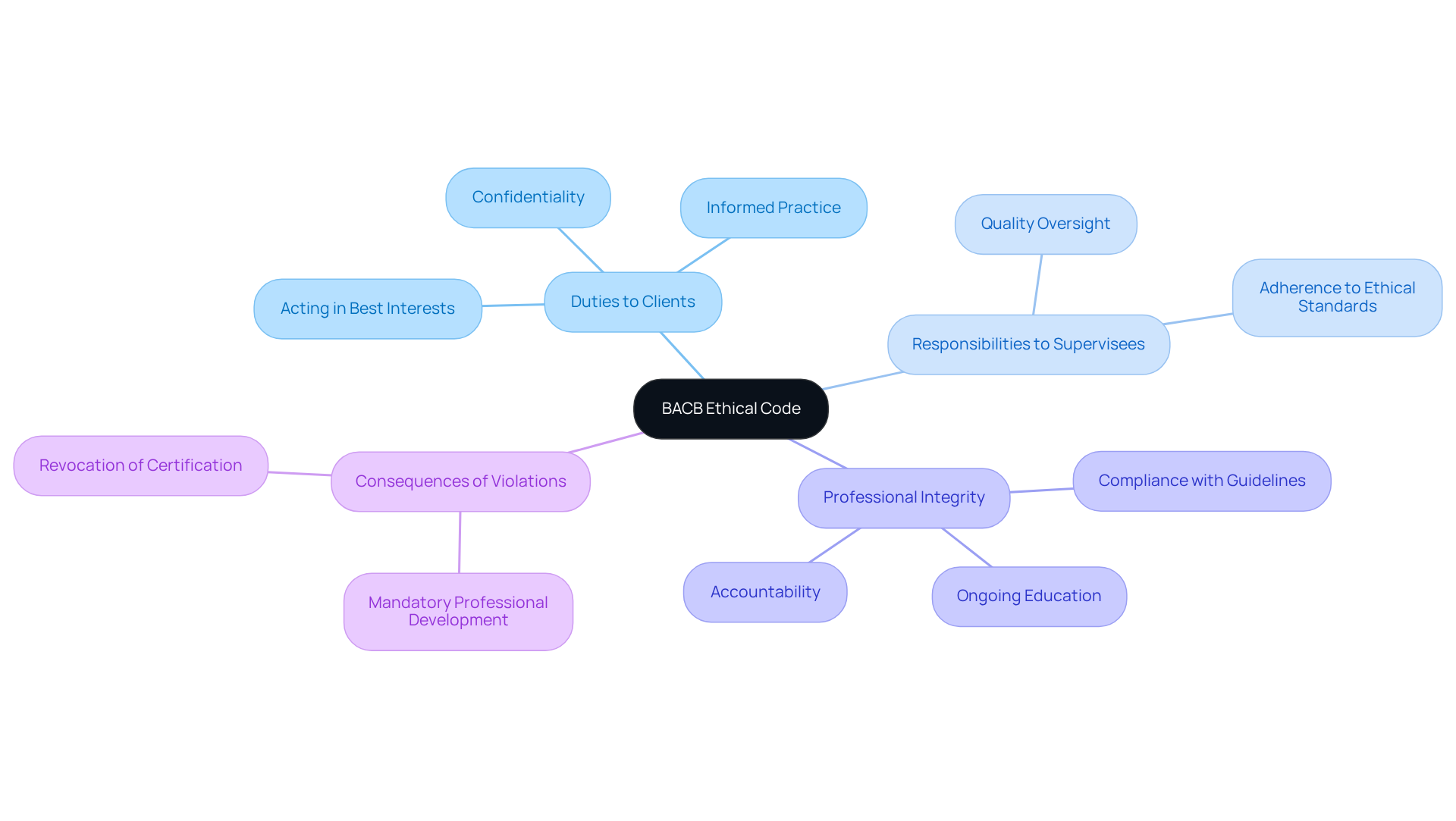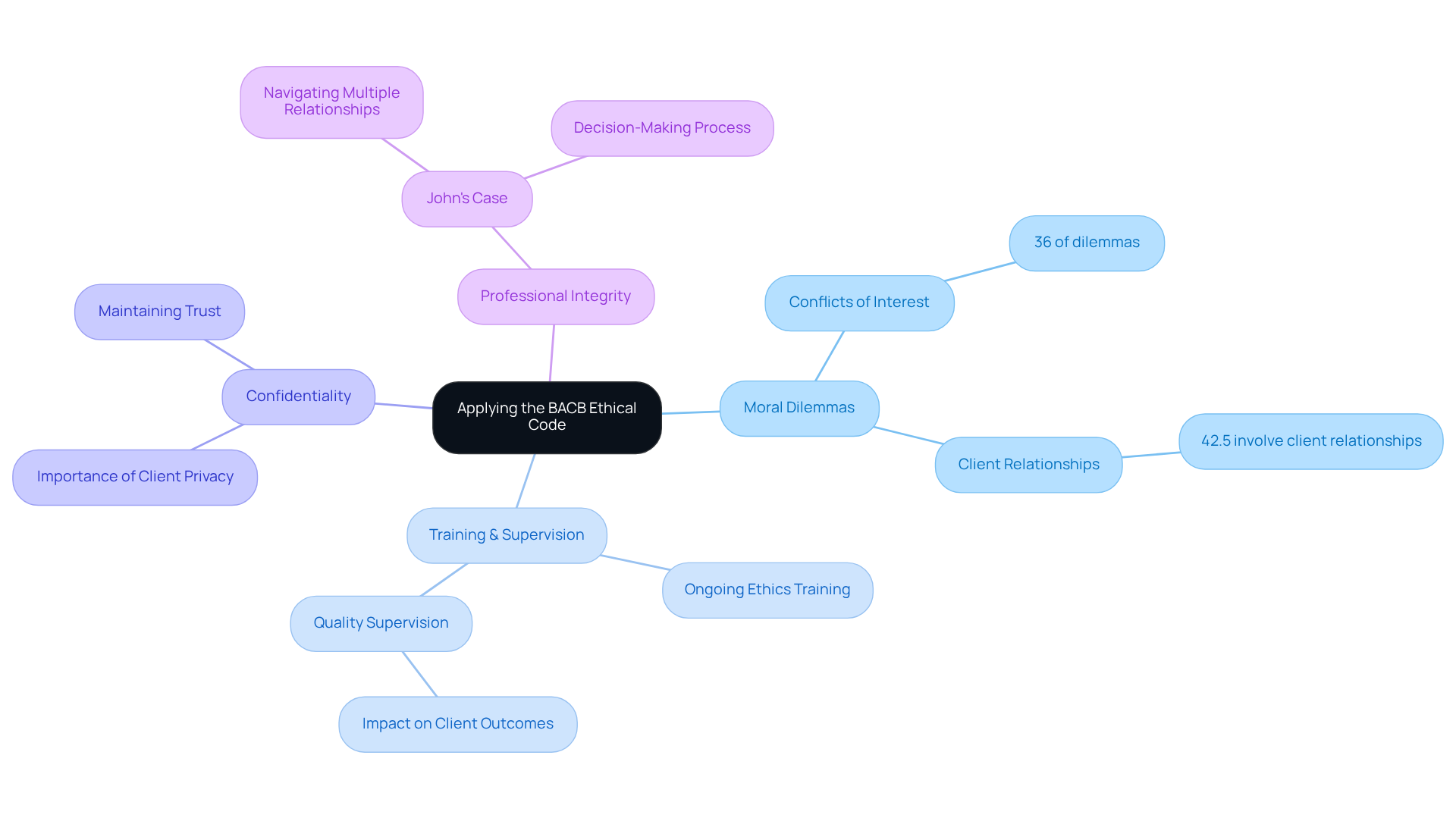August 28, 2025

The article underscores the critical necessity of mastering the BACB Ethical Code for behavior analysts. This code serves as a fundamental framework for ethical conduct, safeguarding client welfare, and ensuring professional integrity. Adherence to these ethical standards is not merely advisable; it is essential for fostering trust and accountability within the field.
Consider the ramifications: violations can lead to severe consequences, adversely affecting both practitioners and their clients. This reality highlights the imperative for behavior analysts to commit to these ethical guidelines, not only to uphold their professional integrity but also to protect those they serve.
The ethical landscape of behavior analysis is fundamentally shaped by the BACB Ethical Code, a critical framework that delineates the professional standards for Board Certified Behavior Analysts (BCBAs) and their assistants. This code not only safeguards the welfare of clients but also cultivates trust and integrity within the profession.
As practitioners encounter intricate ethical dilemmas, the challenge lies in the consistent application of these principles in practice, all while navigating the potential consequences for violations.
How can behavior analysts ensure they remain compliant and uphold the highest ethical standards in this ever-evolving field?
The serves as an essential framework for all Board Certified Behavior Analysts (BCBAs) and Board Certified Assistant Behavior Analysts (BCaBAs), delineating the moral standards that govern their professional conduct. The bacb ethical code is essential for safeguarding participant welfare, ensuring professional integrity, and promoting moral decision-making within the field of behavior analysis. Central to the bacb ethical code are the duties owed to individuals receiving services, which emphasize acting in their best interests and maintaining confidentiality, as well as responsibilities to supervisees and trainees, ensuring quality oversight and adherence to the bacb ethical code.
In 2025, the importance of adhering to the bacb ethical code cannot be overstated, as it directly influences trust and the overall integrity of the profession. Research indicates that compliance with these ethical standards significantly enhances positive outcomes for individuals, underscoring the necessity for practitioners to remain informed about revisions and updates to the guidelines. Furthermore, the BACB ethical code's commitment to consumer safety and professional behavior is reflected in the rigorous enforcement of these guidelines, which entail consequences for violations, including mandatory professional development and potential revocation of certification.
Experts assert that the bacb ethical code serves to protect clients while also enhancing the credibility of analysts among stakeholders. By consistently upholding these ethical principles, professionals demonstrate their commitment to maintaining high standards of practice, thereby cultivating a culture of trust and accountability within the field. As the landscape of behavior analysis continues to evolve, the bacb ethical code serves as an indispensable resource for guiding ethical practice and ensuring the well-being of those served.

The bacb ethical code is grounded in four fundamental principles that guide behavior analysts in their professional conduct.
These principles not only guide ethical decision-making but also highlight the importance of compassion and respect in analysis, in line with the BACB ethical code, addressing the common ethical dilemmas encountered by BCBAs. Upholding these standards is critical for fostering a and ensuring optimal outcomes for clients.

For behavior analysts, it is essential to integrate the BACB ethical code into daily practice. A staggering 36% of moral dilemmas encountered by practitioners are linked to conflicts of interest, highlighting the pressing need for consistent examination of ethical standards. Engaging in conversations about moral dilemmas with coworkers fosters a culture of awareness. For example, when managing customer confidentiality, practitioners must thoroughly evaluate the potential advantages and dangers, ensuring their actions align with established moral standards. This necessity for thorough assessment against conduct guidelines is further emphasized by the prevalence of patient complaints.
Ongoing ethics training and supervision are crucial in enhancing practitioners' understanding and application of the BACB ethical code. Organizations allocate considerable resources to ethics-focused training programs, and those with robust moral cultures report reduced instances of violations and greater employee satisfaction. These factors culminate in improved outcomes for customers. Real-life situations, such as John's regarding taking a neighbor's child as a case, necessitate that behavior analysts actively implement moral principles. By doing so, they not only ensure compliance but also uphold their professional integrity and dedication to customer welfare. Moreover, the updated BACB ethical code released in 2022 emphasizes the importance of preserving confidentiality for individuals, thereby strengthening the ethical responsibilities of practitioners.

Violating the BACB ethical code can lead to serious disciplinary actions from the BACB, which may include:
These actions depend on the severity of the violation. Consider the case of a professional who breaches confidentiality; such actions may result in immediate penalties. Data indicates that unethical practices significantly erode trust, with studies showing that these practices yield no beneficial outcomes for patients or therapists. This can lead to , discouraging potential new clients and prompting the departure of long-term patients.
The repercussions extend beyond individual cases; organizations employing practitioners may suffer reputational harm, as negative word-of-mouth can tarnish both the practitioner's and the firm's standing. Therefore, it is crucial for behavior analysts to fully comprehend the consequences of the BACB ethical code. Adhering to professional standards not only safeguards their integrity but also ensures the welfare of the clients they serve.
Furthermore, ethical violations must be reported within six months of occurrence or awareness. Individuals facing revocations or suspensions are barred from claiming credentialing by the BACB during the period of revocation or suspension.
Are you prepared to uphold these standards and protect your professional reputation?

The BACB Ethical Code serves as a vital foundation for behavior analysts, underscoring the significance of ethical conduct in safeguarding client welfare and upholding professional integrity. Adherence to this code not only fosters trust between practitioners and those they serve but also bolsters the credibility of the behavior analysis profession as a whole.
Key principles such as:
are essential tenets of ethical practice. Furthermore, the discussion on the consequences of violating these standards highlights the serious implications for both practitioners and their organizations, reinforcing the necessity of ongoing ethics training and vigilance in professional conduct.
Ultimately, committing to the BACB Ethical Code transcends mere compliance; it cultivates a culture of accountability and excellence in behavior analysis. By actively engaging with these ethical standards, behavior analysts can enhance their practice and contribute to positive outcomes for their clients, ensuring they uphold the highest standards of care and professionalism in their field.
What is the BACB Ethical Code?
The BACB Ethical Code is a framework that outlines the moral standards governing the professional conduct of Board Certified Behavior Analysts (BCBAs) and Board Certified Assistant Behavior Analysts (BCaBAs).
Why is the BACB Ethical Code important?
The BACB Ethical Code is essential for safeguarding participant welfare, ensuring professional integrity, and promoting moral decision-making within the field of behavior analysis.
What are the key responsibilities outlined in the BACB Ethical Code?
Key responsibilities include acting in the best interests of individuals receiving services, maintaining confidentiality, and ensuring quality oversight for supervisees and trainees.
How does adherence to the BACB Ethical Code influence the profession?
Adherence to the BACB Ethical Code enhances trust and integrity in the profession, leading to better outcomes for individuals and reinforcing the credibility of analysts among stakeholders.
What are the consequences for violating the BACB Ethical Code?
Consequences for violations may include mandatory professional development and potential revocation of certification.
How does the BACB Ethical Code benefit clients?
The BACB Ethical Code protects clients by ensuring that practitioners adhere to high standards of practice, which fosters a culture of trust and accountability in behavior analysis.
Why is it important for practitioners to stay informed about the BACB Ethical Code?
Staying informed about revisions and updates to the BACB Ethical Code is crucial for practitioners to ensure compliance and maintain the quality of services provided.
What role does the BACB Ethical Code play in the evolving landscape of behavior analysis?
The BACB Ethical Code serves as an indispensable resource for guiding ethical practice and ensuring the well-being of those served as the field of behavior analysis continues to evolve.
Our expert recruitment strategies and AI-driven sourcing ensure that you receive top-notch candidates quickly, without compromising on quality. Whether you’re looking for BCBAs, Clinical Directors, or RBTs, we’ve got you covered.